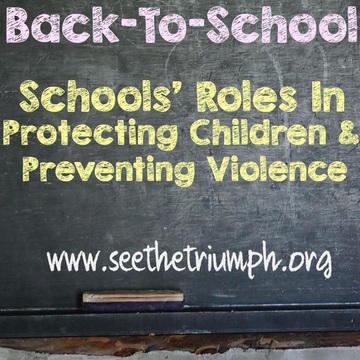|
9/1/2015 Back-To-School: Schools' Roles in Protecting Children and Preventing Violence, Series IntroductionBy Christine Murray, See the Triumph Co-Founder
It’s September, which means that it’s back-to-school season for students, parents, teachers, and other school employees. Back-to-school season can be filled with both excitement about the year to come and stress as families and schools adjust to new schedules and routines. The start of a new school year is a great time to make goals for a positive year ahead. At See the Triumph, we’re using this back-to-school season to focus on ways that schools can help to prevent and respond to violence. Specifically, we’re focusing on ways that personnel in elementary, middle, and high schools can take proactive steps to support children who’ve been impacted by violence and to create safe, nonviolent school climates. We believe that school personnel--including teachers, principals, counselors, and coaches--have opportunities to make a huge impact on the lives of their students. School personnel have a valuable window into their students’ lives, and with their daily contact with students, they are often among the first to notice when students are at risk for or already experiencing violence. We know that teachers and other school personnel have many demands on their time and energy already, especially as many schools across the country have moved to a greater focus on testing and assessment of students. And, often, schools are under-funded and under-resourced, so many teachers and other school employees face daunting jobs in carrying out their primary mission of educating students. Thus, we know that adding a focus on violence prevention and response can seem overwhelming to school personnel, in light of the demands they already face in their work. And yet, violence in its many forms can take a toll on students’ lives and academic performance. When bullying or school violence occurs, the resulting safety threats can damage the safe, supportive learning environment that children need to thrive. Children who witness violence in their homes can experience trauma symptoms that impact their ability to concentrate in school and can reduce their confidence in their ability to succeed in school. Teenagers who face abusive dating relationships may be controlled by a partner in ways that impact their involvement in school, social, and extracurricular activities. And these are just a few examples of the ways that schools can be impacted by violence--either within schools or in the homes of their students. This month, we invite you to consider ways that you can support local schools in efforts to prevent and respond to violence. If you’re a parent or teacher, start conversations within your school to learn about what efforts your school is or can take to address this important issue. If you work in an agency that address domestic and/or sexual violence or child maltreatment, consider how you can build partnerships with local schools to help impacted students get better connected with local resources, as well as to bring educational programming to teach students about safe, healthy relationships. If you’re simply a concerned citizen, look for opportunities in your community to volunteer or otherwise support efforts to address violence and promote safety within schools in your area. Engaging schools in efforts to prevent and respond to violence is critical to supporting students and families in building safe, healthy lives and relationships. We hope you’ll share your own suggestions and experiences throughout this month to offer additional insights as to how schools can help to build safety within relationships, families, and communities! Comments are closed.
|
Archives
July 2024
CategoriesAll About Intimate Partner Violence About Intimate Partner Violence Advocacy Ambassadors Children Churches College Campuses Cultural Issues Domestic Violence Awareness Month Financial Recovery How To Help A Friend Human Rights Human-rights Immigrants International Media Overcoming Past Abuse Overcoming-past-abuse Parenting Prevention Resources For Survivors Safe Relationships Following Abuse Schools Selfcare Self-care Sexual Assault Sexuality Social Justice Social-justice Stigma Supporting Survivors Survivor Quotes Survivor-quotes Survivor Stories Teen Dating Violence Trafficking Transformative-approaches |
Search by typing & pressing enter



 RSS Feed
RSS Feed